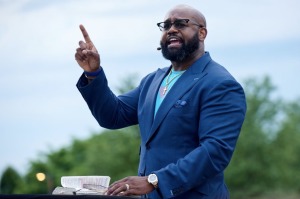Poll: Americans 'Comfortable' With Athletes' Religious Expressions
Religious expressions have always been a part of professional sports. Some athletes thank God for big wins, or make a sign of the cross after scoring a touchdown or, more recently, take some time for "Tebowing" before a game. But do Americans respond positively or negatively to these expressions of faith?
In spite of some controversy over the role of religion, and God, in professional sports, new research released Wednesday by Grey Matter Research and Consulting shows that most Americans are "comfortable" with demonstrations of faith by professional athletes.
According to the study, 49 percent of Americans react positively to such displays, while 32 percent say they react indifferently and only 19 percent react negatively. Among those Americans who regularly attend religious worship services, 64 percent react positively to these displays, 24 percent are indifferent and 11 percent react in a negative way.
Ron Sellers, president of Grey Matter Research, released a statement along with the study and said that most people would expect higher percentages of positive reactions among religious Americans.
"On average, although a majority of people who attend religious worship services have a positive reaction when pro athletes express their religious faith, it is interesting that about 36% don't react positively," said Sellers. "In fact, only 37% say they tend to have a very positive reaction to these expressions of faith. Positive feelings toward these expressions of religious belief are a bit more muted than one might expect among religious Americans."
The study also sought to find out if people react differently when athletes thank "Jesus Christ" rather than "God" in post-game interviews.
"In American society today, references to 'God' are often considered less potentially divisive or offensive than are specific references to 'Jesus Christ,' which are often seen as more sectarian. For this reason, we specifically asked people how they feel about athletes saying things such as 'I want to thank God,' versus 'I want to thank Jesus Christ,'" said Sellers.
Interestingly, those surveyed said they have nearly identical reactions regardless of which name is mentioned. While 52 percent of Americans react positively and 20 percent react negatively to those athletes who thank God after games, a comparable 50 percent react positively and 21 percent react negatively to an athlete who thanks Jesus Christ.
Evangelicals were found to have the most positive reactions to religious expressions by professional athletes, with 87 percent reporting at least some positive reaction and only 8 percent reporting a negative reaction. Of those evangelicals surveyed, 66 percent said they reacted "very positively" to expressions of faith on average, but when an athlete specifically claims that God helped him or his team win, that number drops to 43 percent.
The study, which was conducted by surveying 1,010 American adults in all 50 states, notes that some of the most visible religious athletes as of late have been outspoken evangelicals, including Tim Tebow, Kurt Warner, Curt Shilling, Reggie White and others. But is there a limit to how often professional athletes should share their faith? Should they be concerned about references to God becoming cliché?
Last fall, Warner told The Arizona Republic he thinks Tebow, whose is unabashedly outspoken about his faith, should "be more strategic" about sharing his faith, because people put their guard up when they hear an athlete thanking Jesus Christ, he said. The Grey Matter study seems to suggest the opposite is generally true, however, as most Americans don't seem to mind such comments.





























